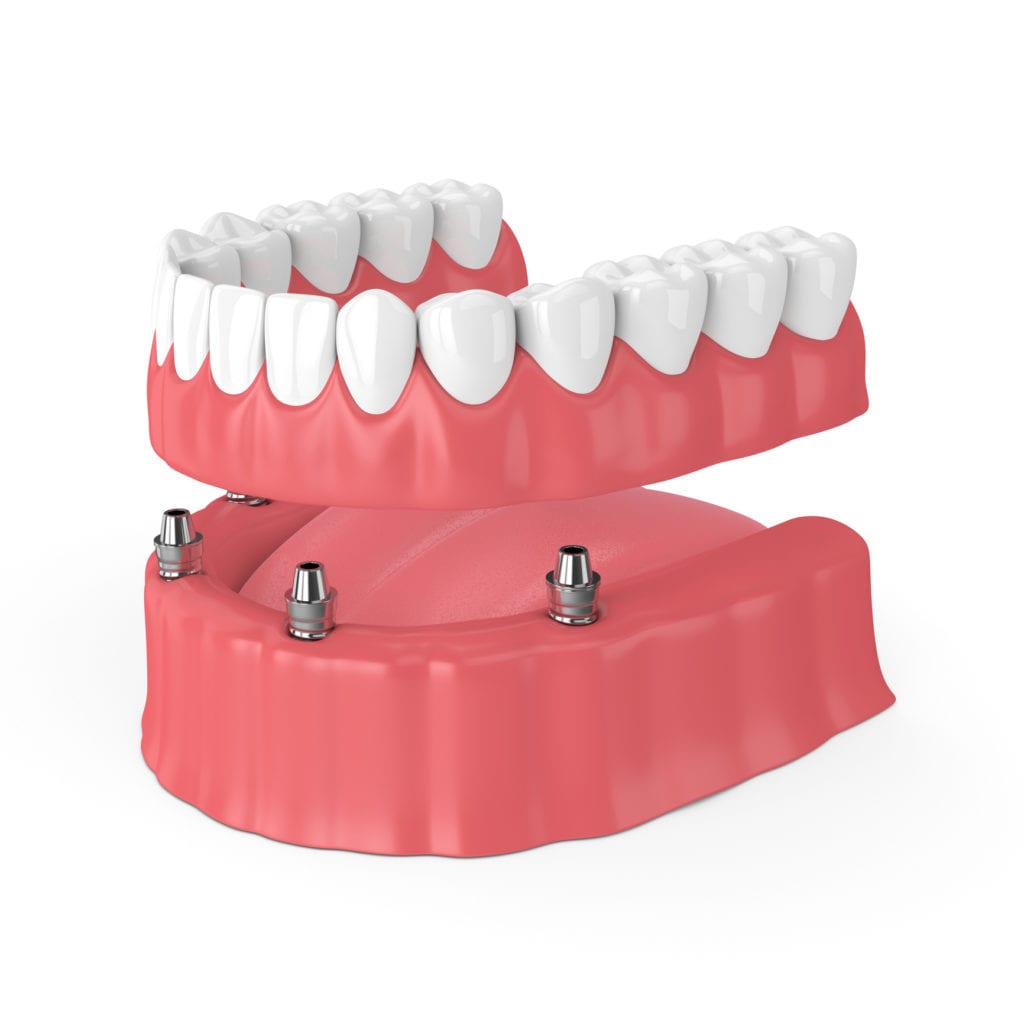Are you missing permanent teeth? Do you have an arch of teeth missing?
Missing or lost teeth can make speaking, biting, talking, and chewing more difficult. At Waterford Family and Cosmetic Dentistry, we can help you restore your smile following tooth loss.
We offer full and partial dentures in our Leland, NC dental office for patients missing full rows of teeth. Dentures are a restorative dental solution that helps patients eat the food they love and improve the look and function of their bite.

Why Replace Missing Teeth?
It is important to replace your missing teeth sooner than later. Missing one or more teeth can often lead to:
- Shifting teeth
- Overcrowding
- Tooth decay
- Misaligned bite
- Speech problems
- Facial sagging
Not promptly replacing missing teeth can speed up these processes and open up more opportunities for complex and costly dental issues. Please call our office for treatment if you have just lost a tooth due to an injury or need a replacement for an existing restoration.
Partial and Full Dentures
Partial dentures are prosthetic teeth made of a plastic or acrylic base with a metal framework. They can be attached to the mouth with crown-capped teeth or dental implants. This treatment option works best for patients with multiple consecutive missing teeth.
Full dentures usually use snaps and adhesive to restore the full arches of missing teeth. We recommend implant-secured full dentures to patients because they provide long-term benefits. Dental implants stabilize prosthetic teeth so there is no risk of slippage.
Traditional dentures will require daily removal and cleaning. They can also slip around the mouth because they are not attached to the tooth root.
Additionally, if you have an existing full or partial denture, it can be converted into an implant-supported denture. Our office works with local implant surgeons and can provide the final restoration attached by implants.
Implant-Supported Dentures
One of the most significant benefits of implant-supported dentures is their superior stability. Traditional dentures can slip, shift, or even fall out when eating, speaking, or laughing, which often leads to discomfort and embarrassment.
Implant-supported dentures stay firmly in place because they attach to titanium posts surgically placed in the jawbone. This secure fit allows you to eat a wider variety of foods, speak clearly, and smile confidently without worrying about your dentures moving out of place.
Another major advantage is improved comfort. Because implant-supported dentures are anchored in the jawbone, they do not rest on the gums, which reduces the risk of sore spots and irritation. The implants also help evenly distribute the pressure of chewing, which makes eating more comfortable and enjoyable. Many patients report that implant-supported dentures feel more like natural teeth than traditional dentures.
Implant-supported dentures also play an important role in preserving your oral health. When you lose teeth, the jawbone naturally begins to deteriorate over time because it no longer receives stimulation from tooth roots. This bone loss can lead to a sunken facial appearance and further oral health issues.
Dental implants act as artificial tooth roots and provide the necessary stimulation to prevent bone loss. By preserving bone density, implant-supported dentures help maintain your facial structure and keep you looking younger for longer.
Additionally, implant-supported dentures enhance your overall quality of life. Their secure fit and natural feel allow you to enjoy your favorite foods without restrictions, speak clearly without fear of slippage, and smile with confidence. They also require less maintenance than traditional dentures since they do not need adhesives and are easier to clean. With proper care, implant-supported dentures can last many years, making them a durable and cost-effective long-term solution.
Frequently Asked Questions
We will answer some of the most frequently asked questions patients have about dentures and partials.
Can you have dentures with gum disease?
Yes, you can have dentures with gum disease, but it’s important to address it first. Treating gum disease helps ensure a healthier mouth and a better fit for dentures. Untreated gum disease can cause discomfort and affect the stability of your dentures. Your dentist will likely recommend treating any gum issues before fitting you with dentures. This will ensure the best outcome.
Is wearing a partial denture uncomfortable?
Wearing a partial denture can be uncomfortable at first as your mouth adjusts. Initially, you might experience some soreness or difficulty speaking and eating. However, most patients adapt within a few weeks. Proper fit and regular adjustments by your dentist can help minimize discomfort. Good oral hygiene and care for your dentures also improve comfort. If discomfort persists, contact your dentist for further adjustments.
Will I have trouble speaking with new dentures?
You might have some trouble speaking with new dentures at first. Minor speech difficulties are common as your mouth adjusts. Practicing speaking, reading aloud, and repeating difficult words can help speed up the adjustment process. Most people adapt within a few weeks, and speech returns to normal. If issues persist, we can make adjustments to improve the fit.
Can you get dentures while pregnant?
Yes, you can get dentures while pregnant. It’s safe to have dental impressions and fittings for dentures during pregnancy. However, it’s important to let your dentist know about your pregnancy so they can take any precautions. Routine dental care is important during pregnancy to maintain oral health and address any issues promptly.
Is it better to get full dentures or partials?
Whether you should get full dentures or partials depends on your dental situation. Full dentures replace all the teeth in an arch, while partials replace only the missing teeth. Partials preserve the remaining natural teeth. If you have healthy teeth remaining, partial dentures might be the better option to maintain those teeth.
Can you sleep with partial dentures in your mouth?
We don’t recommend sleeping with partial dentures in your mouth. Removing them at night allows your gums to rest and prevents potential irritation. Furthermore, cleaning your dentures overnight helps maintain their condition and prevents infections.
Schedule a Dental Appointment
Contact Waterford Family and Cosmetic Dentistry by calling 910-519-1624. You may also request a consultation with our dental team online. Please let us know if you have questions about your options for restoring your missing teeth. We will be happy to help you.
